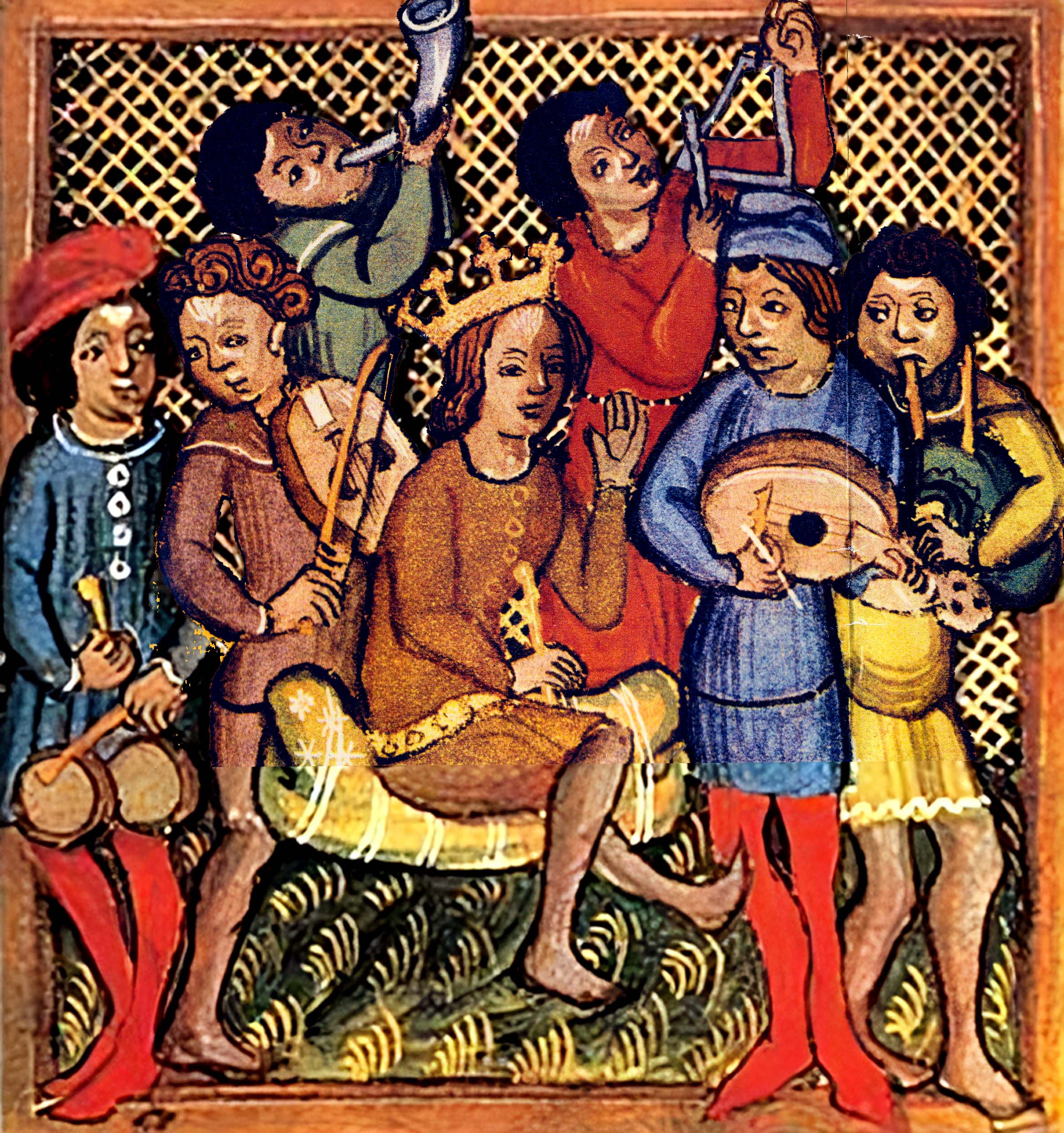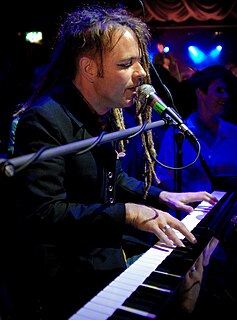Related Research Articles

A fiddle is a bowed string musical instrument, most often a violin. It is a colloquial term for the violin, used by players in all genres including classical music. Although violins and fiddles are essentially synonymous, the style of the music played may determine specific construction differences between fiddles and classical violins. For example, fiddles may optionally be set up with a bridge with a flatter arch to reduce the range of bow-arm motion needed for techniques such as the double shuffle, a form of bariolage involving rapid alternation between pairs of adjacent strings. To produce a "brighter" tone, compared to the deeper tones of gut or synthetic core strings, fiddlers often use steel strings. The fiddle is part of many traditional (folk) styles, which are typically aural traditions—taught 'by ear' rather than via written music.

In the broadest sense, Medieval music encompasses the music of the Western Europe during the Middle Ages, from approximately the 6th to 15th centuries. It is the first and longest era of Western classical music and followed by the Renaissance music; the two eras comprise what musicologists term as early music, proceeding the common practice period. Musicologists generally divide the era into early (500–1150), high (1150–1300), and late (1300–1400) Medieval music.

In western music, a motet is a mainly vocal musical composition, of highly diverse form and style, from the late medieval era to the present. The motet was one of the pre-eminent polyphonic forms of Renaissance music. According to Margaret Bent, "a piece of music in several parts with words" is as precise a definition of the motet as will serve from the 13th to the late 16th century and beyond. The late 13th-century theorist Johannes de Grocheo believed that the motet was "not to be celebrated in the presence of common people, because they do not notice its subtlety, nor are they delighted in hearing it, but in the presence of the educated and of those who are seeking out subtleties in the arts".

Renaissance music is vocal and instrumental music written and performed in Europe during the Renaissance era. Consensus among music historians has been to start the era around 1400, with the end of the medieval era, and to close it around 1600, with the beginning of the Baroque period, therefore commencing the musical Renaissance about a hundred years after the beginning of the Renaissance as it is understood in other disciplines.
Medieval metal is a subgenre of folk metal that blends heavy metal music with medieval folk music. Medieval metal is mostly restricted to Germany where it is known as Mittelalter-Metal or Mittelalter-Rock. The genre emerged from the middle of the 1990s with contributions from Subway to Sally, In Extremo and Schandmaul. The style is characterised by the prominent use of a wide variety of traditional folk and medieval instruments.
Satyricon is a Norwegian black metal band, formed in 1991 in Oslo. Satyr and Frost have been the band's core members since 1993. The band's first three albums typify the Norwegian black metal style. Since its fourth album in 1999, the band has strayed from this style and included elements of traditional heavy metal in their sound. Satyricon was the first Norwegian black metal band to join a multi-national record label (EMI).

Gregorian chant is the central tradition of Western plainchant, a form of monophonic, unaccompanied sacred song in Latin of the Roman Catholic Church. Gregorian chant developed mainly in western and central Europe during the 9th and 10th centuries, with later additions and redactions. Although popular legend credits Pope Gregory I with inventing Gregorian chant, scholars believe that it arose from a later Carolingian synthesis of Roman chant and Gallican chant.

John Dunstaple was an English composer who was the leading composer of 15th century England and among the most important and influential composers of his time. Crucial in the developing style of the Burgundian School, Dunstaple's music spans the transition from the Medieval to the Renaissance periods.
Persian traditional music or Iranian traditional music, also known as Persian classical music refers to the classical music of Iran (Persia). It consists of characteristics developed through the country's classical, medieval, and contemporary eras. It also influenced areas and regions that are considered part of Greater Iran.
Arnold de Lantins was a Netherlandish composer of the late medieval and early Renaissance eras. He is one of a few composers who shows aspects of both medieval and Renaissance style, and was a contemporary of Dufay during Dufay's sojourn in Italy.
Philippe le Chancelier, also known as "Philippus Cancellarius Parisiensis" was a French theologian, Latin lyric poet, and possibly a composer as well. He was the illegitimate son of Philippe, Archdeacon of Paris, and was part of a family of powerful clerics. He was born and studied theology in Paris. He was chancellor of Notre Dame de Paris starting in 1217 until his death, and was also Archdeacon of Noyon. Philip is portrayed as an enemy to the Mendicant orders becoming prevalent at the time, but this has been greatly exaggerated. He may have even joined the Franciscan order soon before his death.

Duke Special is a songwriter and performer based in Belfast, Northern Ireland. A piano-based songwriter with a romantic style and a warm, distinctly accented voice, he has distinctive long dreadlocks, eyeliner and outfits he describes as "hobo chic". His live performances have a theatrical style inspired by Vaudeville and music hall, and often incorporate 78s played on an old-fashioned gramophone, or sound effects from a transistor radio. He is most often accompanied by percussionist "Temperance Society" Chip Bailey, who plays cheese graters and egg whisks, a Stumpf fiddle and a Shruti box, as well as the more typical drums and cymbals. Other musicians who perform with Wilson from time to time include Paul Pilot (guitar), Réa Curran, Ben Castle, Ben Hales, Gareth Williams, "Professor" Ger Eaton (keyboards), Dan Donnelly and Serge Archibald III.

Classical music is art music produced or rooted in the traditions of Western culture, including both liturgical (religious) and secular music. While a more precise term is also used to refer to the period from 1750 to 1820, this article is about the broad span of time from before the 6th century AD to the present day, which includes the Classical period and various other periods. The central norms of this tradition became codified between 1650 and 1900, which is known as the common-practice period.

The Bishop of Durham is the Anglican bishop responsible for the Diocese of Durham in the Province of York. The diocese is one of the oldest in England and its bishop is a member of the House of Lords. Paul Butler has been the Bishop of Durham since his election was confirmed at York Minster on 20 January 2014. The previous bishop was Justin Welby, now Archbishop of Canterbury. The bishop is one of two who escort the sovereign at the coronation.
The music of the video game Final Fantasy IX was composed by regular series composer Nobuo Uematsu. It was his last exclusive Final Fantasy score. The Final Fantasy IX Original Soundtrack, a compilation of all music in the game, was originally released on four Compact Discs by DigiCube in 2000, and was re-released by Square Enix in 2004. A Best Of and arranged soundtrack album of musical tracks from the game entitled Final Fantasy IX: Uematsu's Best Selection was released in 2000 by Tokyopop Soundtrax. Final Fantasy IX Original Soundtrack PLUS, an album of music from the game's full motion videos and extra tracks, was released by DigiCube in 2000 and re-released in 2004, and a collection of piano arrangements of pieces from the original soundtrack arranged by Shirō Hamaguchi and performed by Louis Leerink was released as Piano Collections Final Fantasy IX in 2001.

John Maus is an American musician, composer, singer, and songwriter known for his baritone singing style and his use of vintage synthesizer sounds and Medieval church modes, a combination that often draws comparisons to 1980s goth-pop. His early lo-fi recordings anticipated and inspired the late 2000s hypnagogic pop movement. On stage, he is characterized for his intense displays of emotion while performing. He is also a former teacher of philosophy at the University of Hawaii, where he later earned his PhD in political science.
The Final Fantasy Crystal Chronicles video game series consists of Crystal Chronicles, a spin-off of the main Final Fantasy series, its sequels My Life as a King and My Life as a Darklord, and their spin-offs, Ring of Fates, Echoes of Time and The Crystal Bearers. Crystal Chronicles, Ring of Fates, and Echoes of Time have had released soundtrack albums to date, and Crystal Chronicles and Ring of Fates each have an associated single. Kumi Tanioka is the main composer for the series, having composed the three released soundtracks as well as the music for My Life as a King and My Life as a Darklord. Hidenori Iwasaki is filling that role for The Crystal Bearers. Nobuo Uematsu, the main composer for the regular Final Fantasy series, contributed one track to the Ring of Fates soundtrack. Yae and Donna Burke sang the Japanese and English versions of the theme song for Crystal Chronicles, respectively, while Aiko sang the theme song for Ring of Fates.
Matheus de Sancto Johanne, also known as Mayshuet, was a French composer of the late Medieval era. Active both in France and England, he was one of the representatives of the complex, manneristic musical style known as the ars subtilior which flourished around the court of the Avignon Papacy during the Great Schism.

The 1975 are an English pop rock band formed in 2002 in Wilmslow, Cheshire. Now based in Manchester, the band consists of lead vocalist, producer, lyricist and rhythm guitarist Matthew Healy, lead guitarist Adam Hann, bassist Ross MacDonald, and drummer/producer George Daniel.

The Manuscrit du Roi or Chansonnier du Roi is a prominent songbook compiled towards the middle of the thirteenth century, probably between 1255 and 1260 and a major testimony of European medieval music. It is currently French manuscript no.844 of the Bibliothèque nationale de France. It is known by various sigla, depending on which of its contents are the focus of study: it is troubadour manuscript W, trouvère manuscript M, and motet manuscript R. It was first published by French musicologist Pierre Aubry in 1907.
References
- ↑ "The Works of Queldryk". Medieval Music Database. La Trobe University. 2 June 2003. Retrieved 14 November 2012.
- ↑ Wathey, Andrew (1989). Music in the Royal and Noble Households in Late Medieval England: Studies of Sources and Patronage. New York and London: Garland Publishing. p. 261.
- ↑ Bent, Margaret. "Queldryk (Qweldryk)". Grove Music Online. Oxford Music Online. Retrieved 6 November 2012.
| | This article about a British composer is a stub. You can help Wikipedia by expanding it. |